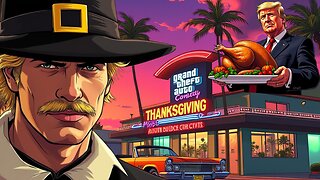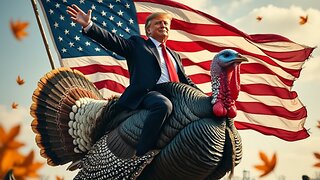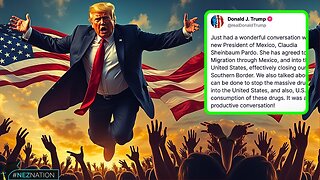Premium Only Content

Biohazard
The Dangers of Nuclear Power and Genetically Modified Food
We were once told that nuclear power was safe, abundant, and cheap.
But the reality is far from this.
Nuclear power stations are expensive and unsafe.
Every station leaks radioactive material.
The mantra of atomic energy commissions worldwide is "no harm to human health".
But the truth is, there is no safe level of radiation.
Our bodies can repair some damage, but when it's overwhelming, our genome gets distorted.
This damage has unknown consequences and is passed on to our offspring.
Then there's genetically modified food.
It might look and taste like food, but it doesn't sustain life.
It's horrifyingly dangerous.
In the past the United States, were forbidden to label genetically modified food as such.
Genetically modified foods have been on supermarket shelves since the 1990s, but they’ve only required a label for the last year.
Why?
Because the FDA has decided that genetically modified food is substantially equivalent to unmodified food.
Over 90% of consumers don't want genetically modified food.
But the FDA mostly prevents them from knowing which food is genetically modified.
This is illegal and inhibits free speech.
The FDA also forbids examining any safety reports on genetically modified food other than a preliminary safety assessment by the company that holds the patent.
The consequences of genetically modified food are largely unknown.
But where they are known, they are universally bad.
They cause infertility, sterility, lethal allergies, cancer, and a variety of horrible diseases and conditions.
It's time we rethink our reliance on nuclear power and genetically modified food.
the use of “bioengineered” in place of the more widely-known term “GMO” upset a coalition of food retailers and nonprofits that sued the USDA.
Initially, the disclosure statement that took effect in 2020 was voluntary. Mandatory labeling began Jan. 1, 2022, and foods and packages include a small seal or text that says “bioengineered,” or “derived from bioengineering.”
What foods are bioengineered?
Alfalfa
Apple
Canola
Corn
Cotton
Eggplant
Papaya
Pineapple
Potato
Salmon
Soybean
Squash
Sugarbeet
Yet much of the bioengineered labeling winds up on products that use GMO crops. Most of the corn, canola, soybeans and sugar beets harvested in the U.S. are genetically modified, said William Hallman, a professor and chair for Rutgers University’s Department of Human Ecology.
“We make so many ingredients out of those particular crops,” Hallman said.
For instance, high fructose corn syrup made from corn goes into lots of other foods.
But that also presents a sort of loophole in the USDA’s standards. Hallman said corn oil, canola oil, and sugar from sugar beets are “basically stripped of the DNA in them.” So even though the crops are genetically modified, “the ingredients don’t necessarily qualify for mandatory disclosure,” he said.
https://www.ams.usda.gov/rules-regulations/be/bioengineered-foods-list
The end minutemen
-
 LIVE
LIVE
Pepkilla
5 hours agoHappy Thanksgiving ~ Wumble StwEeeem
253 watching -
 7:24:25
7:24:25
Rotella Games
1 day agoThanksgiving Side Missions & Hangout | GTA San Andreas
17.5K2 -
 4:07:31
4:07:31
MafiaTwin
3 hours agoFrist Stream On Rumble
14.1K -
 19:41
19:41
Neil McCoy-Ward
7 hours agoFinally! Some Good News Today... (& Happy Thanksgiving!)
6.17K2 -

tacetmort3m
8 hours ago🔴 LIVE - (HAPPY THANKSGIVING!) BACK WITH MORE STALKER ACTION - STALKER 2 - PART 7
5.76K -
 58:05
58:05
The Tom Renz Show
3 hours agoThanksgiving In America 2024 - With Mark Sherwood
3.84K1 -
 1:13:41
1:13:41
DDayCobra
6 hours ago $7.38 earnedHappy Thanksgiving!
34.4K2 -
 42:24
42:24
Professor Nez
6 hours ago🚨Kamala's Staff CONFESSES to FRAUD! Trump is Already MAKING AMERICA GREAT AGAIN! 🇺🇸
68K101 -
 5:12:17
5:12:17
Akademiks
8 hours agoDrake Sues Universal Music Group over Kendrick Lamar 'Not Like Us' again!! Diddy Denied Bail!
81.5K10 -
 1:23:15
1:23:15
Viss
7 hours ago🔴LIVE - Thanksgiving PUBG (Short Stream)
35.9K29